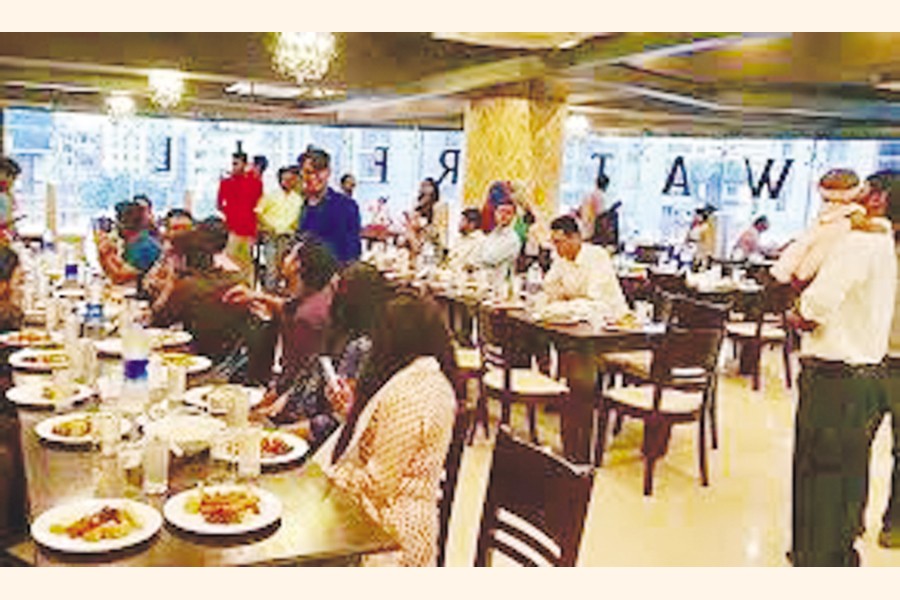
Published :
Updated :

Following the Bailey Road fire tragedy, the restaurant business is witnessing a drastic slump. This is for two reasons: one, those willing to dine out think twice before visiting the more fancied eateries particularly housed in a multi-storey building; second, different government agencies are conducting raids against restaurants for non-compliance of rules and regulations. The Rajdhani Unnayan Kartripakkha (RAJUK), city corporations and the police have all got into the act of penalising errant dining facilities not just in the capital but also sporadically in other urban centres.
In order to avoid the consequences of such drives, shopping complexes housing restaurants in some cases have taken the ingenuous step of hoisting a notice at the main gate announcing that the complex will temporarily remain closed for construction of an emergency exit. The authorities there have also expressed regret for the inconvenience caused due to this. But others are not smart enough and they have kept the restaurants or the entire building under lock and key. If the restaurateurs and/or owners of the buildings fail to show up when teams of the different agencies visit such establishments, the facilities or the entire buildings are sealed off. In other cases such facilities are slapped with a hefty fine for various irregularities including a lack of or non-renewal of occupancy certificates and fire safety arrangements.
The RAJUK and the Bangladesh Fire Service and Civil Defence (BFSCD) teams are mostly sealing off restaurants for their location in multi-storey buildings. The two city corporations also seal off restaurants and exact fine from such facilities. But the police have conducted raids on about 500 restaurants, liquefied petroleum gas (LPG) shops and chemical warehouses. Only six cases were filed for lacking in fire safety measures or storing combustible materials.
When so many agencies get into the act of penalising restaurateurs, one pertinent question comes to the fore ---are the agencies carrying out the drives in a coordinate manner or some of these agencies have chosen to hit the soft belly just before Ramadan to their own convenience? The other question that follows is, if the sealed off restaurants in multi-storey building will never be allowed to operate without the requisite safety measures. Even if those are allowed, how many of the restaurants will be in a single multi-storey building?
In the first place, the various agencies which have become hyperactive now are to blame for either turning a blind eye to the chaotic development or were a party to it. It is unimaginable that all these restaurants have operated so long without some licences. They could not find accommodation in droves unless the authorities permitted them to operate. The excuse that the agencies run short of manpower to conduct regular check on them will be a lame one. When the basic issue of existence of many restaurants ---as many as 18 restaurants in one 13-storey---is concerned, the approving agencies cannot deny their part in this awful accommodative fracas.
After each such catastrophe, different agencies get embroiled in a blame game, hardly ever taking any remedial measures for the future. Happily, this time the RAJUK has lately come up with 16 directives which, if complied with, may go a long way to serving as a deterrent to such tragedies in the future. The number one concerns compliance of the Dhaka Metropolis Building (construction, development, preservation and demolition) Regulations-2008 and the Bangladesh National Building Code (BNBC), 2020 while constructing a building. Other directives such as adherence to the building plan and design, receiving occupancy certificate compulsory etc. are routine affairs. What is particularly important is the unambiguous legal provision for no accommodation of hotels or restaurants in any commercial building. It also makes it incumbent that the restaurateurs obtain approval from the authorities concerned before starting a restaurant.
There are other provisions such the illegality of storing combustible materials in such buildings. Compliance with fire safety plans and regular check of fire extinguishers and other fire safety devices, among other requirements, are a must. Now, if these are followed up by actions, things are sure to improve. But past experiences do not make one very optimistic about the execution of the provision at the field level.
If this measures are implemented, the majority of the restaurants in multi-storey buildings will have to be closed sine die. Can the authorities take such a drastic measure? There are 0.481restaurants, employing 3.0 million people in the country. Sure enough, not all of those eateries will be affected but a large number will be. It would be in the fitness of things to make arrangement for alternative locations close by, so that the restaurants can restart their business as early as possible where the risk of fire will be minimised as much as possible.


 For all latest news, follow The Financial Express Google News channel.
For all latest news, follow The Financial Express Google News channel.